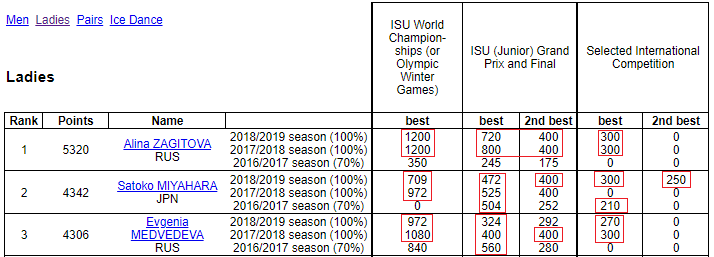
Introduction to ISU World Standings
Introduction to ISU World Standings
The ISU World Standings is a system used by the ISU to rank skaters based on their results at recent competitions. World Standings, as well as season’s best scores, can affect whether a skater is invited to the Grand Prix Series. World Standings also determine the starting order in the short program at major competitions such as the Grand Prix Series and ISU Championships/Olympics.
Information in this guide is summarized from ISU Communication 2550. The latest World Standing lists can be seen on the ISU website.
See also: More intro to skating guides
Last updated: Apr. 8, 2023
POINTS AND COMPETITION ELIGIBILITY:
Skaters earn World Standing points based on their placement at various competitions. Starting in 2023, there is a separate World Standing list for skaters who have earned points from junior competitions, as well as a combined list of junior and senior skaters.
Points for the ISU Championships (Worlds, 4CC/Euros, Junior Worlds) can only be earned by skaters who qualified for the free skate.
“International competitions” must fulfill the following conditions in order to be eligible for World Standing points.
The following number of competitors must finish the short program:
Singles: Minimum 8 skaters out of 4 ISU member nations
Pairs: Minimum 5 teams out of 3 ISU member nations
Ice dance: Minimum 6 teams out of 4 ISU member nations
For Challenger Series events:
The members of the Technical Panel (Technical Controller and two Technical Specialists) must be from 3 different ISU member nations. Other rules regarding the qualifications and composition of officials must also be followed.
There must be a minimum of 7 judges on the panel, all from different ISU members.
For other international events:
The members of the Technical Panel (Technical Controller and two Technical Specialists) must be from 3 different ISU member nations. Other rules regarding the qualifications and composition of officials must also be followed.
There must be a minimum of 5 judges on the panel, and no ISU member can have a majority.
Events that are only open to skaters from certain regions (eg. Asian Winter Games, Nordics), or for certain groups of skaters (eg. World University Games, only for university students) are not eligible to provide ISU World Standing points.
CALCULATION OF WORLD STANDINGS:
World Standing points are counted over 3 seasons: the current season and two preceding seasons. Points from the current and previous season are weighted at 100%. Points from two seasons ago are weighted at 70%.
Up to 5 competitions per season are counted: best result (by points) from the ISU Championships or Olympics, 2 best results from the Grand Prix Series (including the Final), and 2 best results from Challenger events or other international competitions. If a skater wins both Euros/4CC and Worlds in one season, they do not receive points from both competitions. They will only receive 1200 points from Worlds. If a skater placed 4th at Worlds (875 points) and won Euros/4CC (840 points), they would receive 875 points from Worlds. The same principle applies to the Grand Prix and other international competitions, except with the best 2 results instead of the best result.
Additionally, over the span of 3 seasons, only the best 2 point results from the ISU Championships or Olympics are counted, the best 4 point results from the Grand Prix, and the best 4 point results from Challengers or other competitions.
These are the women’s world standings at the end of the 2018-19 season:
Points from the 2018-19 and 2017-18 seasons are weighted at 100%. Points from the 2016-17 season are weighted at 70%. The points that count towards each skater’s total are outlined in red.

